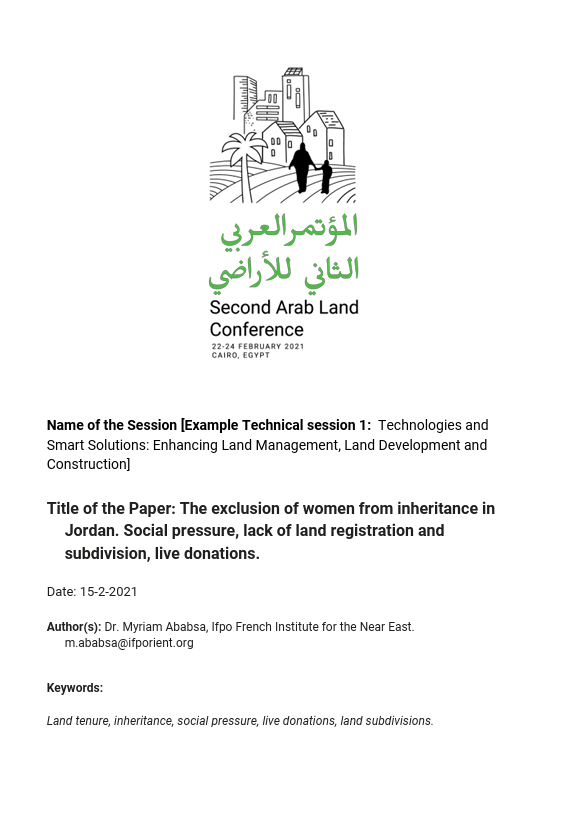Resource information
A patriarchal pattern of power dominates both inheritance and property in Jordan. This pattern affects women, but also the youth - which is much less studied. While the inheritance rights of women are formally enshrined in the constitution, in Islamic law (Sharia), female heirs continue to face social pressure to renounce their rights in favor of male heirs. Only one fourth of Jordanian women entitled to property inheritance receive it fully. Elder sons decide of the fate of the father, not always following the Sharia law. A survey conducted in the Irbid governorate in 2010 by the Jordanian National Forum for Women indicated that 20 percent of women had renounced their inheritance rights and that three-quarters of them had done so willingly. However, positive trends are appearing with the mobilisation of women's rights activists, and the fact that women are less renouncing to their rights. In 2020, a fifth of heirs fully relinquished their inheritance rights through the process of takharruj, the voluntary “opting out” of their rights (exclusion), according to the Sharia court1. It is a positive reduction from a third of cases in 2014. Records do not specify their gender, but survey evidence shows most of those who requested exclusion were women. However, it would be good to also study youth exclusion by older brothers. Besides social pressure, women are deprived of their inheritance in several other ways. The most common is the absence of subdivision of land, sometimes over decades, in order not to pay any taxes (division of ifraz taxes) and to counter land fragmentation. This often happens with agricultural land, but also with family-owned buildings. The law does not oblige to register each housing unit in a building. Land and property are not formally registered. Between 2004 and 2015, one million new housing units were built in Jordan (Census 2004 and 2015). 37% of them only were built with a proper permit and 30% were regularized several years after their building. A third were built without permits. Another usual way to deprive women from inheritance is donation to male heirs before the father's death. In most cases male heirs give symbolic gifts to women, called badal or takrim, which are worth far less than the value of shares they are legally entitled to receive. In general, women are kept in the dark about the real value of assets such as land or an apartment. As a consequence of such cultural norms, only 6.8 percent of ever married women owned their houses and only 7 percent owned land in 2012 (Jordanian Department of Statistics and ICF 2013, Jordan Population and Family Health Survey 2012). This is similar to Egypt (4%, Lebanon 3%). Figures are different when considering only registered land and apartments at the Jordanian Department of Land and Survey: respectively 20.2% and 24.7% belong to women (DLS 2015). In comparison, women owned 22.5 percent of securities, whether bonds, shares, or options in 2011 (DOS and KVINFO 2012). Husbands often register apartments and securities in the name of their wives to protect their assets from creditors, if their business goes bankrupt.

